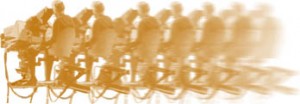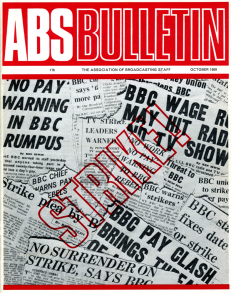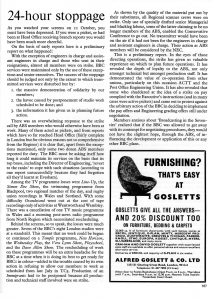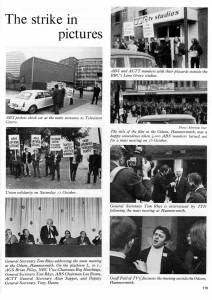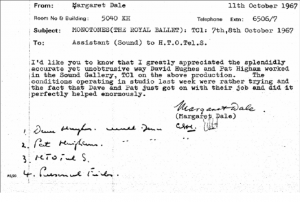Follows on from Our friend Victoria
Geoff Fletcher
Doing things badly was always difficult. Do you remember the ABS ‘work to rule’ we had to apply for a few days back in the mid 1960s? Directors had to direct us to the nth degree, saying things like "Camera. 4 pan right – stop!" or "Zoom out 3 – stop now!" And so on. It was very difficult to just keep on panning or zooming – shooting off set etc. if they forgot the "stop", and to stay out of focus if they forgot to tell us to focus up, or not to frame properly – looking room and so on – if they didn’t actually direct us. Not to do all the things which had become second nature to us was so hard and went against all our instincts and training, but it also exposed all the directors who couldn’t actually direct!
Tony Crake
I think that work to rule was in 1966 : I hadn’t been at TVC that long, and I remember Geoff Feld going off on a tracking crab all the way out through the double doors into Blue assembly causing absolute mayhem! The director was Moira Armstrong ( I think ) …she burst into tears and the whole show just stopped! Every body just shuffled about looking uneasy! I think we had a ‘visit’ from one of the "Suits" later on, but by then the whole of TVC had stopped! It must have carried on some time, I remember doing a large overhead mic rig which came to a total stop, as according to the "rules" anything "slung" had to be done by the riggers! (A certain amount of mischief on the part of the Sound Crew soon scuppered that!)
Peter Hider
During the work to rule, I was doing a “Blue Peter” directed by Alan Russell, which involved a mid-shot of a girl on a trampoline. “Pan up, stop, pan down stop… “ – you get the picture. Alan, a man of great humour and pragmatism, changed it to a wide shot for the live TX.
Biddy was not best pleased.
Nick Ware
Is my memory playing tricks with me? I was there in the mid 1960s, and I don’t remember a work to rule, or people going to such ludicrous, even sabotage, lengths. Surely, knowing not to track a camera out into the blue assembly is a reasonable expectation of even the dimmest cameraman’s basic unsupervised or undirected skills! As I remember it, ACTT wasn’t even recognised by the BBC, and only a handful of Tech-Ops bods were members, on the special reduced ‘BBC rate’. All I remember was the ABS meetings I attended, which were more akin to Sunday afternoon tea with the Vicar!(I can say that without being accused of anti-vicarism because my Dad was one, and I lived in a vicarage at the time). And, by the way I was an ACTT member by then, so that I could moonlight with a semi-clear conscience – but that’s another story.
Dave Plowman
I can well remember it. One such was a live Cliff Richard show from TVT, where it had to run to time, as part of that work to rule. It was obvious well before the end that is was over-running – and the last part was a production number to pre-record sound. However, pres cut it just before the scheduled end, where the cameras pointed to the floor.
Not ludicrous, either. BBC management at that time were more keen on keeping costs down than making sure their staff had reasonable pay.
David Brunt
Would it be this one?:
SHOW OF THE WEEK
BBC Two England, 5 April 1966 21.00
presenting
CLIFF RICHARD and THE SHADOWS
with The Norrie Paramor Orchestra
Design, Mel Cornish
Production, STEWART MORRIS
Geoff Fletcher
It was an ABS work to rule.
From my diaries, the ABS work to rule started on Wednesday 22 March 1967. On Monday the 13 March the ABS members had voted for militant action.
There was nothing ludicrous about it at the time. The point of the exercise was to disabuse the management of the notion that all Tech Ops and sound and camera ops in particular did nothing except what they were told to do by Directors, did not think for themselves, made no contribution to programmes, and were generally the equivalent of low skilled blue collar workers in heavy industry.
Alec Bray
I well remember the "Work to Time" of March 1967. As far as it affected the crew I was on, we did "Softly Softly" (22nd March 1967) pretty much as usual (query perhaps because the stagger through was done on the Tuesday, before the start of the action?), but with the full knowledge that the lines would be disconnected exactly on 20:50 (end of TX). There was a bit more urgency to the usual "pacey pacey" of the floor manager, and as I recall we underran by nearly 5 minutes!
There were reports in the newspapers of the time (but I have not been able to find anything online): what I do remember is that the reports in the newspapers about this industrial dispute by the ABS were wrong – incorrect about the reasons for the action and incorrect in the effects it would have. It made me (even more) sceptical about what I read in the newspapers when they had incorrectly reported something that I was involved with.
Bernard Newnham
I think the dispute was mostly about acting up – there was a whole legion of people acting in their posts, especially vision supervisors, and it had been going on for years, effectively cheap labour. People who asked whose posts they were filling by acting up got short shrift.
I remember people being enormously reluctant. There wasn’t even a tech-ops section of the ABS at the time, and most people didn’t belong anyway. Eventually there was enough anger that a new ABS section, TV5, was started and we all joined. The work to rule was threatened for ages, but tech-ops management didn’t believe anything would happen till it did. I think it was successful and Engineering suddenly found that they could have more posts after all.
Geoff Fletcher
We were all – engineers and tech ops – lumped in together in, I think, TV4 at the time of the work to rule/hours. There was certainly much concern expressed at ABS meetings re acting up on the engineering side, and among the Vision Control section. On cameras we would act up for just short of the (again I think) 80-days after which the acting grade became substantive and then be reverted again to the lower grade. The points I mentioned were also bones of contention, and eventually lead to the formation of TV5 which better reflected our tech ops concerns. I was one of the prime movers in the formation of TV5 along with, among many others, Geoff Feld and the late great Pete Ware.
Management didn’t learn from the work to rule/hours unfortunately, and eventually there was a full-blown strike a couple of years later. I attach a report and a page of pictures from the ABS magazine relating to this. There’s a good pic of Geoff holding forth, and I am seen on a picket line third from left holding an ABS Official Strike placard. There is another photo showing the picket line outside Lime Grove. How many of the chaps on the lines can you name?
(Click on the pictures below to see larger versions:
use your Browser’s BACK button to return to this page)
Roger Bunce
I know I’ve reported this before, but this is all I remember of the Work to Rule.
In the 1960s, a BBC Television Cameraman was completely incapable of independent thought. At least, that was what it said in his official BBC Job Description. He could not use his own initiative; he could not originate ideas; he could not react intuitively to a performance nor make any interpretation; he could make absolutely no creative contribution to the production process. He could do nothing but blindly follow the Director’s instructions. This demeaning Job Description bore no relation to actual working practice, but it was used to justify the Cameraman’s demeaningly low pay grade.
Irritation at the situation peaked in 1967 when there was a ‘Work to Rule’. For the duration of the Industrial Action, Cameramen would obey their Job Description to the letter. We would do exactly what the Director told us, even if it was a slip of the tongue. No matter what the actors were doing in the shot, the Cameraman would only react if specifically instructed to do so. For example, we would only pan if the Director told us to pan, and then we would not stop panning until he told us to stop. It was all very childish, but then the Job Description itself was very childish, and this seemed the only way of highlighting the problem.
It was also very hard work – both for the Director, who had to anticipate and vocalise every slight movement, however unrehearsed, and for the Cameramen, who struggled to suppress all their natural creative instincts.
Matters were even more complicated for the number 4 Cameraman, who was the junior Cameraman on the Crew. He was on a lower pay grade than the others because, officially, he would only be required to perform ‘Simple’ camerawork. In this context ‘Simple’ was defined as only one camera operation at a time. Thus, he could pan, or track, or crab, or zoom, but he could not combine any two or more of these operations in a single shot. In reality, almost all camera movements require a combination of operations.
My crew was working on a comedy series “The World of Wooster” at the time, starring Ian Carmichael as Bertie Wooster and Dennis Price as Jeeves. The Director was Michael Mills, who handled the Work to Rule with consummate skill and good humour. I was the number 4 Cameraman, sentenced to perform only ‘Simple’ camerawork. One of my shots required me to track in to a close-up of Ian Carmichael. Normally, this would be achieved by craning up as I tracked in. However, under the conditions of the Work to Rule, I was allowed to track and maintain focus, but I was not allowed to crane, tilt or in any other way reframe the shot as I tracked. The result would have been a track into Bertie Wooster’s tie knot, rather than his face.
Fortunately, the Cast and Production Team all supported our action and were prepared to conspire to make the shot work. We arranged that, as I tracked in, Ian Carmichael would bend at the knees, in order to keep his face in the frame. It is a measure of his talent and professionalism that, without any distraction from his performance, he maintained a perfectly composed shot, throughout the move.
Tony Crake
Strikes seemed to go on for years…. I seem to remember sitting in a Studio Gallery doing nothing ( standby ) in support of "Stable Lads" ? and even OBs which I went to finally at the end of 1977… a Golf Tournament was crewed by management with quite hilarious results then abandoned… And doing a Stewart Morris show at the New London Theatre in Sound Only (NO idea what that was about!) Also possibly a Horse Jumping at Wembley pulled out of at the last minute (tempers flared somewhat as I recall ) …and it must have been into the 1980s we had a strike scheduled at Wimbledon on the Friday afternoon the week before play started. This was when Martin Hopkins did his huge "Technical Facilities" check. The strike was set to start at 1500. Martin started rehearsing at exactly 1400. Everything worked exactly as per his spec! (couldn’t believe it!) and swept , as only Martin could, out the door at 1459!
There were a lot of irritating press types, however, trying to wind us up on the way out… not pleasant!
Bernie Newnham
It all got a bit mad, and a sense of proportion was distinctly lost, probably on both sides .
I was working on a show in TC1 and the ventilation engineers were on strike with the aircon off. The place was like an oven but we carried on. Then some management person turned the aircon back on, and life improved considerably. Then the TM came down and told us to stop working because the aircon being on was strike breaking. So we walked out.
When I moved to Pres, and I found myself on the edge of management. I had to drop out, and was, frankly, relieved.
As ever, those on strike don’t appreciate the effect they have on people who aren’t their bosses but are caught up in it all. There was one all out strike which lasted several days, at the end of which crews and engineers came back and just picked up where they’d left off. I had a list of trail slots a mile long that I was scheduled to fill, and we worked a lot of extra hours to catch up – and no overtime for us.
Pat Heigham
I wonder if the TC1 Show was ‘The Royal Ballet – Monotones’. I was Grams on that, and later received a nice thank-you from Maggie Dale (attached). It was 1967.
I used to get confused with Dickie Higham (Lighting) as I had an ‘e’ in my surname!
I do not remember much about the so-called work-to-rule as I believe it did not affect sound staff.
(Click on the picture below to see larger version:
use your Browser’s BACK button to return to this page)
Nick Ware
That rings true to me too, and goes a long way to explaining why I wasn’t particularly aware of the camera work-to-rule.
It is my memory only remembering the good bits then! I look back on those days as a time of relative contentment, which clearly it wasn’t. I just don’t remember it being that bad.
As a gram-op you did work pretty much on your own. It would have been C- for gram-ops. By 1980 I had been a gram-op for nearly ten years and never made it to grade C. That’s one of the reasons I left – that and the offer of M.I.T., so leaving the BBC was a ‘no-brainer’. Nevertheless, in terms of job satisfaction I look back on those BBC years as some of my best times, and I’m truly sorry that seems not to have been so for everyone.
Roger Long
The Bristol Film Unit had but 4 recordists in the 1970s and we were called out on strike for many confusing metropolitan issues.
Once we were on strike to support some National issue and it turned out we were the sole participants.
I was meant to be in Germany making a film about the British Army. It was shot mute, the producer stayed out there and the next week when the dispute was settled I went out and the whole shoot was restaged for my benefit, sound only.
I was doing an anthropology series in the Orinoco basin and away from my base for 11 weeks. We met up in Miami for the next production in Florida, on Palm Beach I was given a fat brown envelope containing strike pay! Quite mystifying, the message to lay down my Nagra had never penetrated the high canopy forests of the Brazilian/Venezuelan borders.
We had many problems with productions and daily rates for camping in gruelling conditions that we found difficult to get effective ABS representation for, since the rep worked in maintenance in a gloomy basement and would have willingly gone on the project like a lamb to slaughter.
Looking back on those times is now amusing but then it seemed very important to some, but to me the ABS and the ACTT (we were in both for insurance) strategic aims were opaque and sometimes almost sinister and Orwellian, especially ACTT whose pet project was support of Albania after a fallout in the International Congress…
Wonderful innocent times though.
